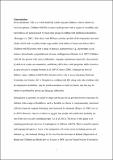| dc.contributor.author | Lyons, Rena | |
| dc.contributor.author | Brennan, Sara | |
| dc.contributor.author | Carroll, Clare | |
| dc.date.accessioned | 2016-04-25T13:16:25Z | |
| dc.date.available | 2016-04-25T13:16:25Z | |
| dc.date.issued | 2015-02-08 | |
| dc.identifier.citation | Lyons, R., Brennan, S. and Carroll, C. (2016) 'Exploring parental perspectives of participation in children with Down Syndrome'. Child Language Teaching & Therapy, 32 :79-93. | en_IE |
| dc.identifier.issn | 1477-0865 | |
| dc.identifier.uri | http://hdl.handle.net/10379/5704 | |
| dc.description.abstract | The everyday lives of children with disabilities are not well understood, with few studies exploring how participation in everyday life is conceptualized and given meaning. The overall aims of this study were, first, to explore parental views of their children's participation and, second, to identify barriers and facilitators in relation to participation in everyday activities. A qualitative research strategy was adopted, whereby parents of children with Down syndrome (DS) aged 6-12 years were selected using purposive sampling. Five interviews with seven participants were audio-recorded and analysed using a framework approach whereby the overall research aims guided the analysis. Analysis of the data identified two main themes and seven sub-themes. The first theme was the value of participation. Parents reported that through participation in activities, their children developed skills that in turn enhanced their well-being and sense of belonging. The second theme was barriers and facilitators of participation, which included four subthemes: child factors, attitudes and views of others, modifications to the environment and logistical issues. Findings also illustrate how the child and his/her physical, social and attitudinal environments are inherently intertwined, with parents identifying the influence of several interacting factors on their child's participation in everyday activities. This study supports the view that while frameworks like the ICF have an important role in understanding disability, they need to be supplemented with personal experiences of children and others in their lives. Speech and language therapists need to consider activities and participation both from the perspective of factors within children themselves and also from the point of view of barriers and facilitators in the children's environment. | en_IE |
| dc.format | application/pdf | en_IE |
| dc.language.iso | en | en_IE |
| dc.publisher | SAGE Publications | en_IE |
| dc.relation.ispartof | Child Language Teaching & Therapy | en |
| dc.rights | Attribution-NonCommercial-NoDerivs 3.0 Ireland | |
| dc.rights.uri | https://creativecommons.org/licenses/by-nc-nd/3.0/ie/ | |
| dc.subject | Down Syndrome | en_IE |
| dc.subject | Parental perspectives | en_IE |
| dc.subject | Participation | en_IE |
| dc.subject | Quality of life | en_IE |
| dc.subject | International classification | en_IE |
| dc.subject | Childhood disability | en_IE |
| dc.subject | Health | en_IE |
| dc.subject | Language | en_IE |
| dc.subject | Youth | en_IE |
| dc.subject | Perceptions | en_IE |
| dc.subject | Speech | en_IE |
| dc.subject | Speech and language therapy | en_IE |
| dc.title | Exploring parental perspectives of participation in children with Down Syndrome | en_IE |
| dc.type | Article | en_IE |
| dc.date.updated | 2016-04-25T13:00:14Z | |
| dc.identifier.doi | 10.1177/0265659015569549 | |
| dc.local.publishedsource | http://clt.sagepub.com/content/32/1/79 | en_IE |
| dc.description.peer-reviewed | peer-reviewed | |
| dc.contributor.funder | |~| | |
| dc.internal.rssid | 10563079 | |
| dc.local.contact | Clare Carroll, Dept. Speech & Language Therapy, Nuig. 5384 Email: c.carroll@nuigalway.ie | |
| dc.local.copyrightchecked | No | |
| dc.local.version | ACCEPTED | |
| nui.item.downloads | 3262 | |


